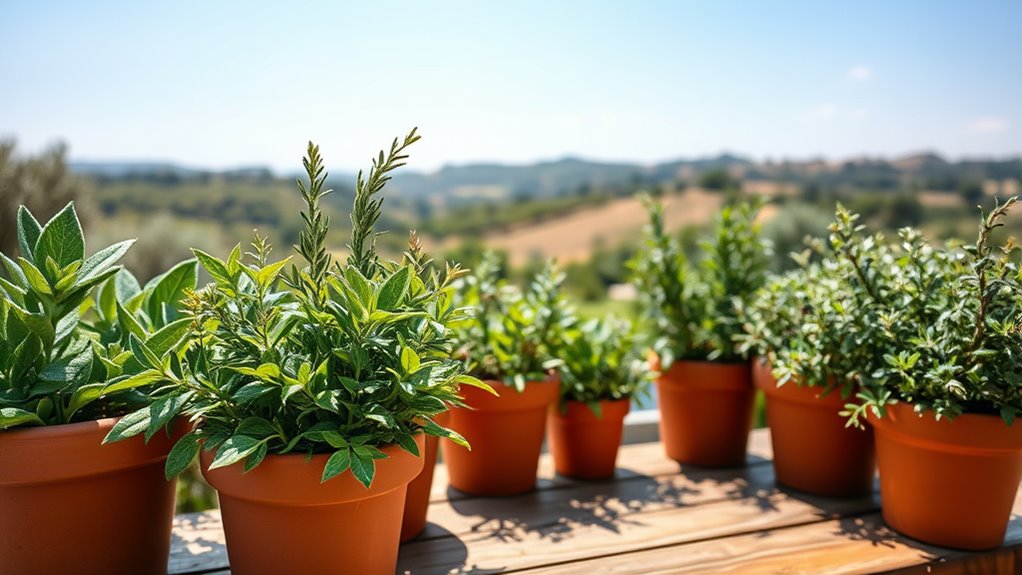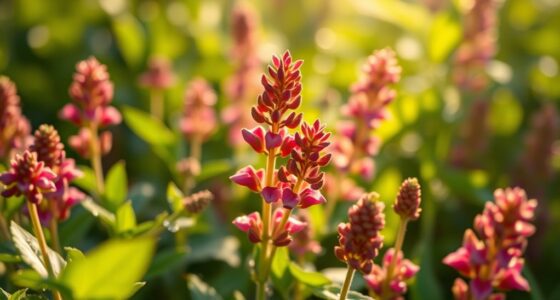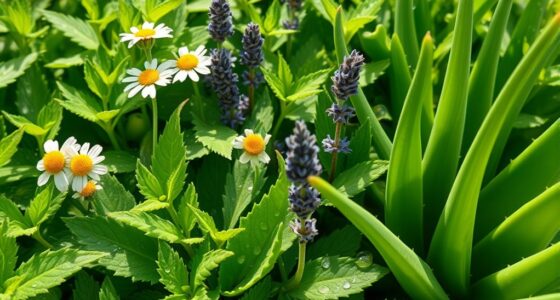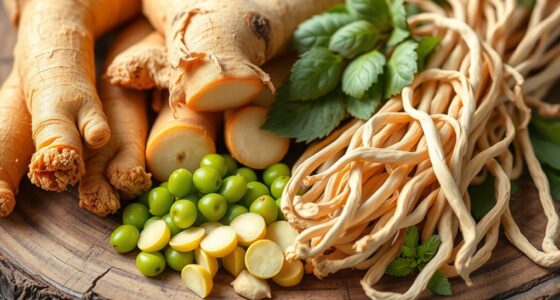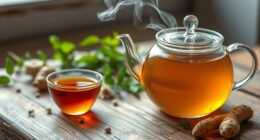In the world’s longest-living communities, herbal remedies and natural practices play a key role in promoting health and longevity. Incorporating herbs like turmeric, rosemary, and sage can reduce inflammation and boost immunity, while traditional remedies support overall well-being. Pairing these herbal lessons with Mediterranean diets, strong social bonds, and active lifestyles creates a holistic approach to aging gracefully. Keep exploring for more ways to integrate these time-tested habits into your life and access lasting vitality.
Key Takeaways
- Blue Zones communities incorporate herbs like sage, oregano, and thyme for their anti-inflammatory and antioxidant properties promoting longevity.
- Herbal teas such as chamomile and green tea are traditional in Blue Zones, supporting relaxation, immune health, and cognitive function.
- Incorporating medicinal herbs like turmeric and garlic can reduce inflammation and chronic disease risk, key factors in aging well.
- Many longevity cultures use herbs to enhance digestion and nutrient absorption, contributing to overall health and vitality.
- Beyond Blue Zones, adopting herbal practices emphasizes natural, plant-based approaches to promote aging gracefully.
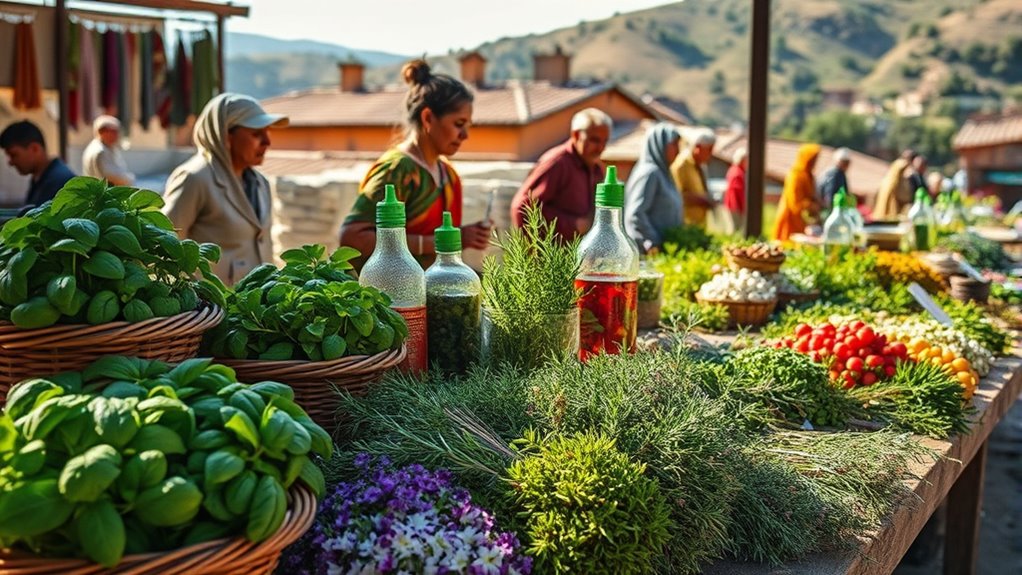
While the concept of Blue Zones has gained popularity for its focus on longevity, exploring beyond these regions reveals even more insights into healthy aging. One of the most significant lessons comes from the Mediterranean Diet, renowned for its heart-healthy benefits and its role in promoting longer, healthier lives. When you adopt this eating pattern, you focus on fresh vegetables, fruits, whole grains, nuts, olive oil, and moderate fish consumption. It’s not just about what you eat, but how you eat—shared meals with family and friends often emphasize the social aspect of food, which is equally essential for longevity. The Mediterranean Diet encourages a balanced approach that minimizes processed foods and added sugars, helping to reduce inflammation and support your overall well-being.
Beyond diet, social connections play a fundamental role in healthy aging. In the regions studied, including parts of the Mediterranean, maintaining strong social bonds isn’t just a cultural tradition; it’s a key component of mental and physical health. When you stay socially active, you lower your risk of depression, cognitive decline, and even cardiovascular issues. Participating in community activities, nurturing friendships, and spending quality time with loved ones bolster your sense of purpose and belonging. These social interactions provide emotional support, reduce stress, and foster resilience against health challenges that come with aging.
Strong social bonds boost mental and physical health, reducing depression, cognitive decline, and cardiovascular risks.
You might notice that in these regions, aging gracefully often involves an active lifestyle intertwined with meaningful relationships. Instead of isolated routines, people tend to stay engaged physically and socially, which enhances their quality of life. Incorporating regular physical activity—whether walking, gardening, or dancing—complements a nutritious diet and social engagement, creating a holistic approach to well-being. This synergy between diet, activity, and social bonds helps extend not only lifespan but healthspan—the years you live free of disease. Additionally, engaging in activities that promote sensory development can further support cognitive health in aging populations.
Embracing lessons from beyond the Blue Zones means recognizing that longevity isn’t solely about genetics or lucky locations; it’s about lifestyle choices you can make today. Prioritize a Mediterranean-style diet and actively nurture your social connections. These habits aren’t just beneficial for your body—they also enrich your emotional and mental health. As you incorporate these practices, you’ll find that aging becomes less about decline and more about thriving. The real secret is creating a balanced, connected life—one that promotes vitality and purpose at any age.
Frequently Asked Questions
How Do Cultural Differences Influence Herbal Practices in Blue Zones?
Cultural differences shape herbal practices by influencing how people use regional plants and develop herbal traditions. You’ll notice that each culture’s herbal remedies reflect its unique history, beliefs, and environment. These cultural herbal traditions determine which plants are valued and how they’re prepared, creating diverse approaches to health. Your understanding of herbal practices should consider these regional differences, as they play a vital role in shaping longevity and wellness in different communities.
Are Synthetic Supplements as Effective as Natural Herbs for Longevity?
You might wonder if synthetic supplements match the effectiveness of natural herbs for longevity. While supplements can provide targeted nutrients, natural herbs often hold centuries of traditional knowledge that support herbal sustainability and holistic health. You should consider that herbal remedies benefit from cultural practices and biodiversity, making them more sustainable and potentially more effective over time. Relying on traditional knowledge helps preserve herbal wisdom and promotes long-term wellness.
Which Herbs Are Most Recommended for Mental Clarity and Cognitive Health?
You’re probably wondering which herbs are best for mental clarity and cognitive health. Herbal cognitive enhancers, like ginkgo biloba, and brain-boosting herbs such as rosemary and bacopa, can support your mental performance. These herbs improve blood flow, reduce anxiety, and enhance memory. Incorporate them into your routine to naturally boost focus, clarity, and overall brain health, helping you stay sharp and alert throughout your day.
How Can Urban Environments Incorporate Herbal Longevity Practices?
You can incorporate herbal longevity practices into urban environments by starting urban gardening projects and supporting local herbal markets. Grow herbs like rosemary, basil, and ginseng in small spaces or community gardens to boost mental clarity and overall health. Visiting herbal markets allows you to access fresh, medicinal herbs. These practices make it easier to integrate healing plants into your daily routine, promoting longevity even in busy city settings.
What Are Potential Risks of Substituting Traditional Herbs With Modern Pharmaceuticals?
Think of replacing traditional herbs with pharmaceuticals as trading a trusted map for a GPS; you might lose the nuanced guidance. You risk herbal interactions that could cause adverse effects, and dependency on pharmaceuticals may overshadow natural remedies’ benefits. While modern medicine can be powerful, over-reliance might lead to overlooked holistic approaches. Be cautious—substituting herbs without understanding the risks can undermine your health’s natural balance.
Conclusion
So, here’s the irony: while we chase the latest supplements and trendy diets, the secrets to a long, healthy life might be hiding in simple, time-tested herbs and habits from Blue Zones. Maybe all we need is to slow down, enjoy nature’s gifts, and embrace the old ways. After all, the true recipe for longevity isn’t complicated—it’s just a matter of reconnecting with what’s been right in front of us all along.

